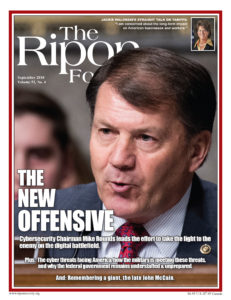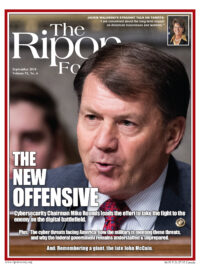
In April of 2000, Gallup conducted a poll in which they asked people a simple question:
“How worried are you that you or someone in your family will become a victim of terrorism — very worried, somewhat worried, not too worried or not worried at all?”
Despite the fact that the U.S. Embassy in Africa had been attacked by terrorists two years earlier and that the first bombing of the World Trade Center had occurred in 1993, only 24% said they were either very worried of somewhat worried that they, too, would be a victim of terror.
Then 9/11 happened, and, obviously, all of that changed. Americans woke up to the nature of the threat we faced, and when Gallup asked that same question shortly after the September 11th attacks, nearly 60% of the public said they were worried that they or a family member would be a victim of a terrorism, too.
Seventeen years later, Americans remain concerned about terrorism — but not just any kind of terrorism. When asked by Gallup earlier this year to list the greatest threat to the vital interests of the United States over the next 10 years, an overwhelming 81% pointed to cyberterrorism. It’s easy to understand why. From online identify theft to Russian interference in the 2016 election, Americans are increasingly finding themselves in the cyber cross-hairs.
In the face of this escalating threat, the latest edition of The Ripon Forum examines the effort underway to strengthen our defenses and make sure that a “Cyber 9/11” never occurs. The effort is being led by individuals like Senator Mike Rounds. Rounds serves as Chairman of the Armed Services Subcommittee on Cybersecurity. In this position, he is one of a growing number of defense leaders who say that the United States can no longer afford to take a reactive approach in the face of emerging cyber threats. “Now, more than ever,” Rounds writes, “our national defense strategy must include protecting our Armed Forces and civilian infrastructure from cyber-attacks by highly-capable adversaries … We have played defense long enough when it comes to cybersecurity. It is time to go on offense.”
Going on offense is one of the reasons why the President decided to elevate U.S. Cyber Command to a unified command status this past summer. Thomas Spoehr and James Di Pane of the Heritage Foundation assess this decision in our latest edition. “As a Unified Combatant Command,” the pair writes, “CYBERCOM’s effectiveness will be enhanced by the ability to work directly with the other combatant commands, and by its commander’s authority to report directly to the Secretary of Defense … this will enhance the amount of impact Cyber Command will wield inside and outside of the Pentagon, which is needed in this critically important area.”
According to Frank Cilluffo, who directs the McCray Institute for Cybersecurity at Auburn, steps like these could not happen soon enough. “Our ability to ‘network’ has far outpaced our ability to protect ‘networks’, Cilluffo writes. “Just think about the Internet of Things, with an estimated 40 billion new devices expected to be interconnected by 2020.” Cilluffo also quotes Homeland Security Secretary Kirstjen Nielsen, who issued this blunt warning earlier this year: “We are in crisis mode. A ‘Cat 5’ hurricane has been forecast, and now we must prepare.’”
Tom Kuhn of the Edison Electric Institute agrees. In an op-ed, he lays out how his industry is working with the public sector to defend America’s energy grid. In another op-ed for this latest edition, Max Stier of the Partnership for Public Service discusses the fact that the federal workforce is currently plagued by a shortage of cyber professionals. With the mid-terms around the corner, election expert Philip Stupak shares his thoughts on “Paper Ballots & Election Security,” while Forum Associate Editor Kyle Chance explores what the states are – and are not – doing to keep the mid-terms secure.
In two other important essays, Bob Bixby of the Concord Coalition examines “Troubling Trends in the Federal Budget,” and former Charlottesville Fire Chief Charles Werner writes about, “A Failure on 9/11, and a Lesson Finally Learned.” And in our latest Ripon Profile, Indiana Congresswoman Jackie Walorski discusses the importance of manufacturers in her District, and how tariffs will impact their work.
Finally, America lost a giant last month with the passing of John McCain. As a small tribute to his life, we republish his 2008 interview with the Forum that not only remains remarkably relevant, but reminds us all of why this hero, maverick, and patriot will be missed.
As always, we hope you enjoy this edition of the Forum, and encourage you to contact us with any questions or comments you might have.
Lou Zickar
Editor of The Ripon Forum
louzickar@clu.ccw.mybluehost.me




